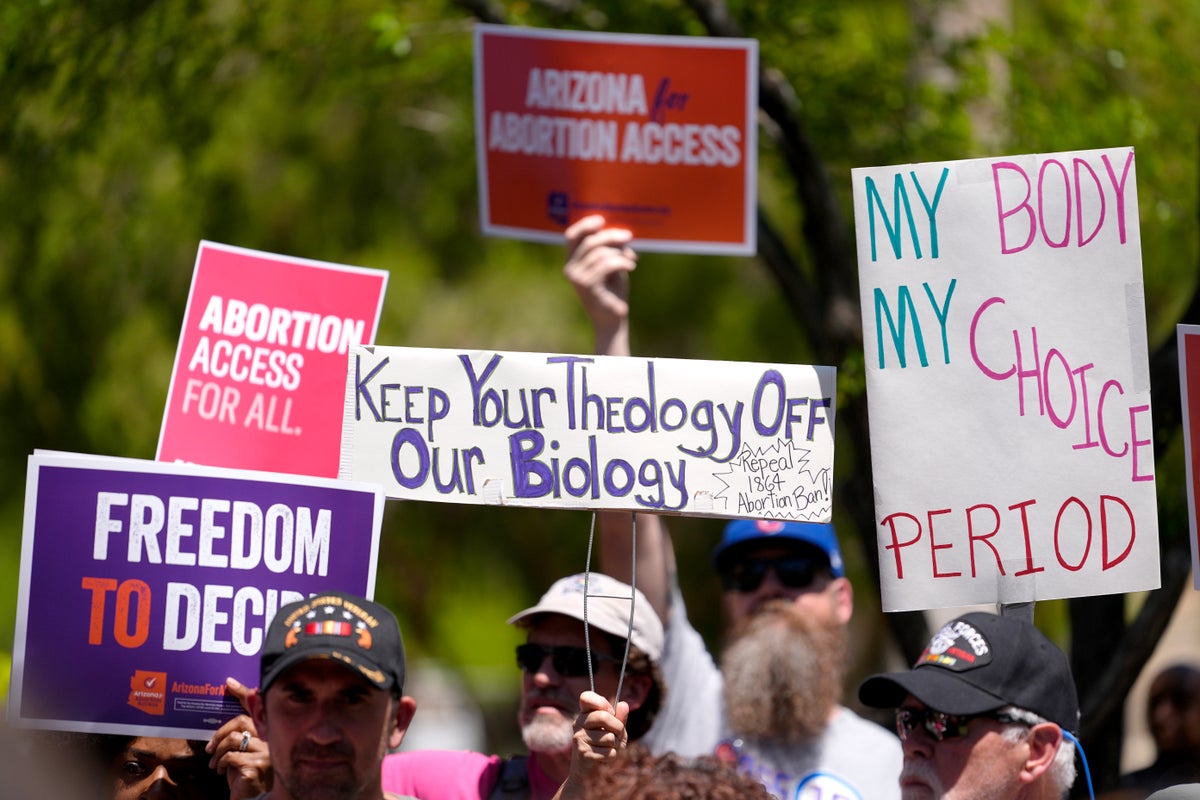
Support truly
independent journalism
With the future of abortion rights resting on November ballots, polling shows that clear majorities of both Republican and Democratic voters in six swing states reject the idea that the government should be criminalizing abortion care, and overwhelmingly want their elected officials to protect access to birth control.
The results of a new survey, from University of Maryland’s Program for Public Consultation, show that most Americans in swing states — including up to 93 percent of Democrats and up to 70 percent of Republicans — do not want most abortion care to be criminalized.
In states where Donald Trump and Kamala Harris are focusing their campaigns, most voters appear to be rejecting Republican-led platforms on reproductive healthcare.
Respondents were instructed that criminalizing abortion care could mean prison or fines for doctors or patients. But when asked who should be punished for what they believe is illegal abortion care, nearly half of the respondents who agreed that it should be a crime declined to answer.
Nearly half of states have restricted access or effectively outlawed most or all forms of abortion care in the two years after the Supreme Court struck down Roe v Wade, leaving decisions about reproductive healthcare up to individual states.
In Arizona and Nevada - swing states where voters will weigh in directly on ballot measures about abortion access this fall - bipartisan majorities do not want abortion to be a crime before a fetus is viable outside the womb, including roughly 70 percent of Republicans and 90 percent of Democrats, the survey found.
Less than half of Republican respondents in swing states of Georgia, Pennsylvania and Wisconsin do not believe abortion should be criminalized.
Large majorities in every swing state — from 64 percent to 73 percent — also support some form of a national abortion law, whether that means criminalizing abortion care at any stage of a pregnancy or guaranteeing a right to abortion care.
Following the Supreme Court’s 2022 decision in Dobbs v Jackson Women’s Health Organization, which struck down a constitutional right to abortion care and gave decision-making power to each state, “people don’t find that satisfactory,” survey director Steven Kull told The Independent.
“They seem to think this should be a national, collective decision, and that’s independent of what people’s views are, whether they are on the spectrum of complete criminalization to no criminalization at all,” he said.
When it comes to birth control, wide majorities of voters in every swing state, and nationally, endorse government-supported policies that reduce unintended pregnancies and abortion.
Up to 80 percent of swing-state Republicans and up to 93 percent of Democrats support requiring schools to provide comprehensive sex education about birth control, and up to 81 percent of Republicans and up to 93 percent of Democrats want the government to ensure nationwide access to birth control, according to the survey results.
The Affordable Care Act’s mandate that insurance companies cover long-term birth control is supported by up to 87 percent of Republicans and up to 96 percent of Democrats in swing states, the poll found.
Funding for healthcare clinics to provide low-cost or free birth control is also supported by up to 71 percent of swing-state Republicans and 93 percent of Democrats.
“There’s a real consensus to reduce the number of unwanted pregnancies, and as a strategy for reducing the likelihood of abortion,” Kull told The Independent. “You had this real big convergence around reducing unwanted pregnancies through greater access to birth control and support for maintaining the provisions in the ACA, Obamacare, that require it.”
Unlike traditional polls, the University of Maryland’s “public consultation survey” participants go through an online “policymaking simulation” in which they review arguments on both sides of the issue. They answer a series of questions after weighing the arguments over a 30-minute survey.
“A lot of polls ask these very general questions that elicit feelings and often not real clear choices about policy options,” Kull told The Independent.
“When it comes to abortion, there are questions like, ‘Do you think the government should allow abortion?’ And that’s a very vague question,” he said. “From some of the other standard polls, you might get the impression that Republicans and Democrats were just really very polarized — that they don’t agree on anything — and we found that there are some issues where they are polarized, but two of the really big ones, criminalization and birth control, was quite a lot of common ground.”
A growing share of voters in swing states now say that abortion is central to their decision this fall, according to recent, separate polling from The New York Times/Siena College.
Harris has vowed to sign legislation that would protect the right to abortion care nationally, while Trump has repeatedly taken credit for ending Roe v Wade and said he intends to vote against a ballot measure in Florida that would enshrine a right to seek abortion care in their states’ constitutions.
Voters in at least nine other states will vote on abortion rights measures this November.







